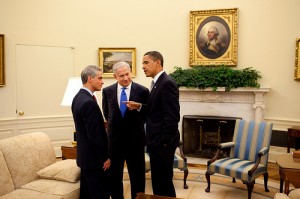The Saudi monarchy and Israeli Prime Minister Benjamin Netanyahu's government view Iran as their gravest strategic threat and thus have pushed for a military option against Iran's nuclear facilities and have favored radical Sunni rebel groups in Syria over the Iranian-backed regime of President Bashar al-Assad.
However, President Barack Obama, Russian President Vladimir Putin and some European leaders have grown increasingly alarmed that Sunni jihadists -- drawing their financing from Saudi Arabia and other Persian Gulf states -- are linking up with al-Qaeda and transforming parts of Syria into bases for terrorism.
These concerns also are putting strains on the regional collaboration between Saudi Arabia and Israel, two traditional adversaries that have only recently come together over mutual interests in seeking to shatter Iranian influence in the region and in supporting the overthrow of the Muslim Brotherhood government in Egypt.
At this point, the young Saudi-Israeli alliance appears to remain intact, with Netanyahu's government directing most of its rhetorical fire against President Obama through its influential neoconservatives in the United States.
Prominent neocon opinion leaders have denounced Obama for engaging in Munich-style appeasement of Iran; they have portrayed him as a modern-day Neville Chamberlain. Israel's favored members of Congress also are pushing for more draconian sanctions against Iran in a provocative move that could torpedo Obama's diplomacy.
But these strident attacks on the Iranian nuclear agreement risk a rupture of Netanyahu's relations not only with the Obama administration but with some European states worried that al-Qaeda affiliates in Syria could pose a renewed terrorist threat to the Continent.
Already, President Putin has expressed his anger at Saudi Arabia for what he viewed as a not-so-subtle threat from Saudi intelligence chief Prince Bandar bin Sultan to unleash Chechen terrorists against the Winter Olympics in Sochi if Russia didn't withdraw its support for the Assad regime in Syria.
Some rank-and-file Jewish supporters of Israel also have voiced concerns about Israel's newfound alliance with the Saudi monarchy, especially given its adherence to ultraconservative Wahhabi Islam and its embrace of a fanatical hatred of Shiite Islam, a sectarian conflict that dates back 1,400 years.
So, Prime Minister Netanyahu may face a difficult choice, either advancing his new regional collaboration with the Saudis or risking the alienation of Israel's traditional allies in Washington and European capitals.
Joint Interests
The Saudi-Israeli alliance has surfaced most notably in the two countries' shared position seeking the overthrow of Syrian President Assad, an Alawite, an offshoot of Shiite Islam. Assad's regime is opposed by an increasingly extremist Sunni rebel movement drawing hundreds of jihadists from across the Muslim world, including Eastern Europe and the Chechen region of Russia.
But that did not deter Israel from siding with the Saudi-backed Syrian jihadists. In mid-September, Israel's Ambassador to the United States Michael Oren announced that Israel would prefer to see the Saudi-backed extremists prevail over the continuation of the Iran-backed, mostly secular government of President Assad.
"The greatest danger to Israel is by the strategic arc that extends from Tehran, to Damascus to Beirut. And we saw the Assad regime as the keystone in that arc," Oren told the Jerusalem Post in an interview. "We always wanted Bashar Assad to go, we always preferred the bad guys who weren't backed by Iran to the bad guys who were backed by Iran."
Saudi Arabia shares Israeli's strategic view that the Shiite crescent, stretching from Iran through Iraq and Syria to the Hezbollah strongholds in Lebanon, must be broken.
Further advancing the Saudi-Israeli detente has been the emergence of the worldly Bandar as Saudi Arabia's new intelligence chief. As the former Saudi ambassador to the United States who worked closely with the neocon administration of George W. Bush, Bandar doesn't share the crude anti-Semitism and visceral antipathy toward Israel that many Saudi leaders did. He is a savvy player who understands the chess board of global geopolitics.
(Note: You can view every article as one long page if you sign up as an Advocate Member, or higher).






